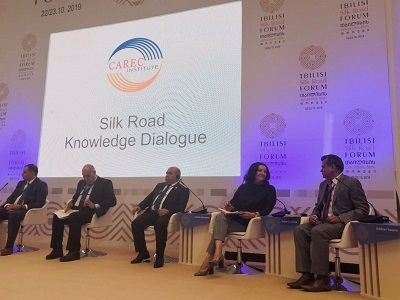The biennial Tbilisi Silk Road Forum was held from October 22-23, an event of the utmost importance for Georgia’s economic development. With over 2,000 people in attendance, the Forum gathered together policymakers, businesses, community leaders and academics to discuss trade and connectivity, as well as examine the challenges facing countries along the New Silk Road.
Production networks, multinational corporations and their value chains have been expanding their presence across countries and regions, and governments are making efforts to enhance trade by lowering trade barriers and signing free trade agreements. Against this backdrop, achieving sustainable growth through technology and industrial and infrastructural upgrades remains critical to facilitating inclusive growth in the region.
Director of ISET Tamar Sulukhia attended the Forum and formed part of the Knowledge Corridors panel. The panel discussed historical contexts with a particular focus on the Silk Road and the objective of knowledge corridors as a means of maximizing input for regional cooperation. The panel spoke about the roles of hard and soft infrastructure (connectivity, digitalization, etc.) in enhancing economic activity and accelerating partnerships. The Director of ISET highlighted that while the means of transferring information have fully transformed and advanced, the role of the Silk Road knowledge corridor remains unchanged in ‘structuring delivery of knowledge’ for creating intangible comparative advantage, as well as sharing evidence which serves to build trust between economic actors and countries. The panel also discussed the role of each actor – the government, think-tanks and universities, development partners and private sector – in ensuring the effective functioning of knowledge corridors.
As Georgia seeks to establish itself as a major economic hub along the New Silk Road, bringing together so many important actors is of critical importance for Georgia’s development. The event was organized by the Government of Georgia and a number of state bodies, with the support of the private sectors and foreign partners.











